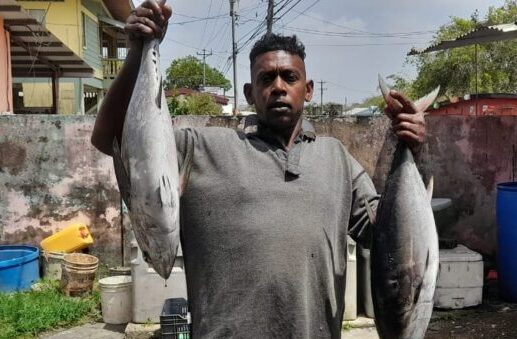By Sue-Ann Wayow
FOR years, Barbadians and Trinbagonians have been fighting over fish – specifically the flying fish.
With an increase in the fish population during the Covid-19 pandemic, there has also been an increase of Bajans fishing in Tobago’s waters depleting the flying fish stock claims the All Tobago Fisherfolk Association (AFTA).
AFTA’s President Curtis Douglas has written to Prime Minister Dr Keith Rowley, stating AFTA’s grievances with the decades long problem.
He told AZP News on Thursday that the letter was sent via email to the prime minister the previous day and was also sent in hard copy via registered mail.
Douglas said, “We will be giving him some time to receive, peruse and respond to that letter because we wanted to do everything officially. We sent the letter to him first and then by next week, we would be sending out the other letters to the ministers and all others so that no-one can say ‘we were not aware of the situation’.”
A subsequent press conference is being planned for next week to provide further updates on the issue he said.
AFTA is claiming that the flying fish, Barbados national dish, was being overfished by the Bajans, leaving little for other fishermen as well as depleting the food chain as larger commercial sea species depend on them for food.
This creates a domino effect on the price of seafood on the retail market.
AFTA’s vice-president Junior Quashie also spoke with AZP News.
He said that his major concern was that the Bajans take all credit for the fish caught in Trinidad and Tobago waters and get a higher monetary value in US dollars.
He said due to the scarcity, flying fish was currently selling at TT$2.50 per pound wholesale and on the retail market, average $25 and up for a pack of five, clean and filleted fish.

The spawning season for flying fish usually starts in October and ends gradually in about August/September.
Quashie said the Bajans usually fish at night and there was no accountability for the number of boats fishing.
He said fishermen all along the north coast of Tobago were severely affected by the intrusion.
AFTA is asking to be included in a consultation process before any other agreement on fishing between the two nations is signed.
“At the end of the day, we are the ones that feel the pinch,” Quashie said.
Fish industry must be regulated with modern law
AFTA’s claims are being backed by Corporate Secretary of the Fisherman and Friends of the Sea (FFOS) Gary Aboud.
Aboud told AZP News that Bajans have a “free for all” over the years and that AFTA’s fear was justifiable.
He said, “The Barbadians have not regulated their catch. The flying fish, come to spawn in our waters. When they come to spawn, that’s when the Bajans come to fish. Regulations must be put in place because even if our fishermen were depleting the resource, there needs to be regulations for them as well.”

Trinidad and Tobago has one of the oldest Fisheries Act in the Western Hemisphere dating back to 1916 which needed to be amended, proclaimed and enforced Aboud said.
The Act was last amended in 1975.
Apart from the flying fish, Aboud said fishermen usually catch all the migratory bluefish such as carite, kingfish, cavalli and others during breeding season.
This causes a challenge not only for Trinidad and Tobago but also other Caricom countries he said.
Aboud said, “We have reached a critical juncture because we cannot afford to take what we want, when we want, how we want anymore.”
History of the flying fish feud
The history of the flying fish relationship turned feud began in the 1960s making its way into popular calypso.
Lord Kitchener sung “Take your meat of meh rice,” about two poor people, a Trini and a Bajan sharing a plate of fish and rice until things went sour.
The Mighty Gabby had his song about the “Flying Fish Diplomacy.”
A research paper titled The flying fish fishery of Trinidad and Tobago by Suzanne Samlalsingh, Elizabeth Pandohee and Erol Caesar published by the University of the West Indies, Cave Hill campus, details the history of the flying fish and its ties to the two countries.
The fish caught was then used as bait in the trolling fishery for dolphinfish and other large pelagics such as wahoo and albacore.
The fishing method called “drifting” or “lurking” was learnt by Tobago fishermen who worked with Bajans on wooden “bumboats” with outboard engines in the 1960s.
Self-proclaimed the Land of the Flying Fish, the fish that is about the size of a pigeon has found its way into almost every authentic Bajan restaurant and snacks and even onto Bajan money and is embedded deep into the southern Caribbean island’s culture.
In the 1980s, the first fishing agreement was signed between Barbados and T&T.
A decade later, former prime ministers Trinidad and Tobago’s George Chambers and Barbados Sir Harold Bernard St John agreed on a T&T’s Exclusive Economic Zone (EEZ) which allows Bajans to fish in local waters.
According to the third United Nations Convention on the Law of the Sea (UNCLOS) established in 1994, national rights were limited to a specified belt of water extending from a nation’s coastlines.
The initial customary three nautical miles was extended in the 21st century so that countries could protect resources, living and non-living.
By 1967, 66 nations had set a 12-nautical-mile (22 km) territorial limit.
The EEZ consists of 200 nautical miles from the baseline and within that area, the coastal nation has sole exploitation rights over all natural resources.

With the impact of climate change in the 21st Century, the flying fish migrated to local waters resulting in Bajan fishermen having to sail to T&T to get their national dish.
In the early 2000s, current Barbados Prime Minister Mia Mottley who was at the time the attorney general encouraged Bajan fishermen to go after their national dish in T&T waters.
But former prime minister Basdeo Panday had warned that the Trinidad and Tobago Coast Guard would deal with Bajan fishermen caught in local waters.
The matter eventually arrived before the Permanent Court of Arbitration based in The Hague in the Netherlands in 2004 and a boundary established .
The court ruled that the Bajans would have a limited right to fish in T&T waters and the exact lines of the EEZ of the two nations would be decided which was approximately in the middle of the ocean separating the two islands.
The issue has been publicised widely by international media.
According to British Sea Fishing, “This dispute also shows the risks of placing a great deal of importance on transient species which can move from one area to another. With climate change and the altering temperature of the world’s seas and oceans, we may see disputes like this becoming more common across the world.”
In 2020, at the signing of a unitization agreement, the second phase of a process which began with a Memorandum of Understanding between the two nations in August 2019, both Prime Ministers Dr Rowley and Mottley acknowledged the fishing situation.
![]()













